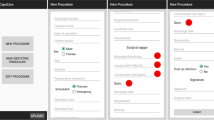Abstract
Background
Countries in Sub-Saharan Africa lack adequate surgical workforces to achieve safe and affordable care for their populations. The Global Surgery movement highlights the urgent need to address this situation. Interventions include not only financial, material and infrastructural support, but also collaborative information flow to support surgical training. In 2015, an electronic logbook was launched for surgical trainees across Sub-Saharan Africa.
Objectives
To assess the integration and context sustainability of surgical e-logbooks in Sub-Saharan Africa.
Methods
In January 2019, a survey analysis of surgical trainees was employed using quantitative and qualitative methods. Participants (active trainees and recent fellows) completed an anonymous internet-based questionnaire evaluating end-user feedback, perceptions and self-reported compliance. Multi-point Likert Scale measures and free-text thematic analysis were used.
Results
358 (68.19%) eligible individuals across 21 Sub-Saharan countries and seven surgical specialties voluntarily participated. The e-resource demonstrated integration into local curricula with the majority of users maintaining activity and reporting moderate-high compliance. Context appropriateness measures were high with 203 (69.76%) deeming it convenient to use. The principle obstacle to compliance was internet connectivity (74, 25.96%), while behavioural factors including supervisor engagement were implicated. The e-logbook demonstrated future sustainability with the majority (243, 78.14%) of participants intent on maintaining usage beyond completion of surgical training.
Conclusions
We describe the successful integration and sustainability of electronic surgical logbooks for trainees across Sub-Saharan Africa. However context-appropriate resources are essential for Low- and Middle-Income Countries. Internet connectivity may hinder the achievement of several Global Surgery objectives in Sub-Saharan Africa.


Similar content being viewed by others
References
Weiser TG, Haynes AB, Molina G et al (2015) Estimate of the global volume of surgery in 2012: an assessment supporting improved health outcomes. Lancet 385:S11
Meara JG, Leather AJ, Hagander L et al (2015) Global Surgery 2030: evidence and solutions for achieving health, welfare, and economic development. Lancet 386:569–624
Biccard BM, Madiba TE, Kluyts HL et al (2018) Perioperative patient outcomes in the African Surgical Outcomes Study: a 7-day prospective observational cohort study. Lancet 391:1589–1598
Holmer H, Lantz A, Kunjumen T et al (2015) Global distribution of surgeons, anaesthesiologists, and obstetricians. Lancet Glob Health 3:S9–11
The World Bank. Specialist surgical workforce (per 100,000 population) - Middle income, High income. https://data.worldbank.org/indicator/SH.MED.SAOP.P5?locations=XP-XD. Accessed 1 April, 2020
Tollefson TT, Shaye D (2016) Expanding roles and broader goals for global surgery. JAMA Facial Plast Surg 18:361–362
Veldenz HC, Dennis JW, Dovgan PS (2001) Quality control of resident operative experience: compliance with RRC criteria. J Surg Res 98:81–84
Singh P, Aggarwal R, Pucher PH et al (2014) Defining quality in surgical training: perceptions of the profession. Am J Surg 207:628–636
Amado V, Martins DB, Karan A et al (2017) Global general pediatric surgery partnership: the UCLA-Mozambique experience. J Pediatr Surg 52:1528–1533
Svendsen ØV, Helgerud C, van Duinen AJ et al (2019) Evaluation of a surgical task sharing training programme's logbook system in Sierra Leone. BMC Med Educ 19:198
Harrington CM, Kavanagh DO, Ryan D et al (2017) Objective scoring of an electronic surgical logbook: analysis of impact and observations within a surgical training body. Am J Surg 214:962–968
Sabatino ME, Alkire BC, Corley J (2019) Financial Investment in global surgery-codevelopment as an accretive evolution of the field. JAMA Surg 154:475–476
Price R, Makasa E, Hollands M (2015) World Health Assembly Resolution WHA68.15: "strengthening emergency and essential surgical care and anesthesia as a component of universal health coverage"—addressing the public health gaps arising from lack of safe affordable and accessible surgical and anesthetic services. World J Surg 39:2115–2125. https://doi.org/10.1007/s00268-015-3153-y
Marks IH, Kamali P, Khan MA, et al Data for the sustainable development of surgical systems: a global collaboration report from the WDI surgical indicators data collection 2016 https://www.lancetglobalsurgery.org/indicators. Published July 2017. Accessed January 28, 2019
Gajewski J, Borgstein E, Bijlmakers L et al (2019) Evaluation of a surgical training programme for clinical officers in Malawi. Br J Surg 106:e156–e165
Gondal KM, Iqbal U, Ahmed A et al (2017) Supervisors' perspective on electronic logbook system for postgraduate medical residents of CPSP. J Coll Physicians Surg Pak 27:540–543
Goldstein SD, Papandria D, Linden A et al (2014) A pilot comparison of standardized online surgical curricula for use in low- and middle-income countries. JAMA Surg 149:341–434
Alliance For Affordable Internet (A4AI). Africa Regional Snapshot: 2017 Affordability Report.https://a4ai.org/2017-affordability-report-regional/. Accessed January 28, 2020
Ecobank Research. The high cost of mobile data in Sub-Saharan Africa. https://www.ecobank.com/upload/publication/20180910054643018QJEBKEVZKD/20180910054635730h.pdf. Published September 2018. Accessed January 28, 2020
GSMA Intelligence. The mobile economy: Sub-Saharan Africa 2018. https://www.gsmaintelligence.com/research/?file=809c442550e5487f3b1d025fdc70e23b&download. Accessed 28 Jan 2020
The Economist Intelligence Unit. The Inclusive Internet Index 2019: Executive summary. https://theinclusiveinternet.eiu.com/assets/external/downloads/3i-executive-summary.pdf. Accessed 28 Jan 2019
Barteit S, Jahn A, Banda SS et al (2019) E-Learning for medical education in Sub-Saharan Africa and low-resource settings: viewpoint. J Med Internet Res 2:e12449
Rickard J (2016) Systematic review of postgraduate surgical education in low- and middle-income countries. World J Surg 40:1324–1335. https://doi.org/10.1007/s00268-016-3445-x
Aphinives P (2013) Implementation of electronic logbook for trainees of general surgery in Thailand. J Med Assoc Thai 96:47–51
Khan MA, Iqbal U, Gondal KM et al (2015) E-Log system in monitoring of residency program: trainees' perspective. J Coll Physicians Surg Pak 25:501–504
Acknowledgements
The authors acknowledge the financial support of Irish Aid for the RCSI/COSECSA Collaboration Programme.
Funding
DM and EO report receiving a grant from Irish Aid to support their work as part of the Collaboration Programme between the College Of Surgeons of East, Central and Southern Africa (COSECSA) and the Royal College of Surgeons in Ireland (RCSI). This study was undertaken as one of the activities of the Collaboration Programme.
Author information
Authors and Affiliations
Corresponding author
Ethics declarations
Conflict of interest
All the authors declare that they have no conflict of interest.
Additional information
Publisher's Note
Springer Nature remains neutral with regard to jurisdictional claims in published maps and institutional affiliations.
Rights and permissions
About this article
Cite this article
Harrington, C.M., Jang, S.S., Mangaoang, D. et al. Integration and Sustainability of Electronic Surgical Logbooks in Sub-Saharan Africa. World J Surg 44, 3259–3267 (2020). https://doi.org/10.1007/s00268-020-05613-z
Published:
Issue Date:
DOI: https://doi.org/10.1007/s00268-020-05613-z




